Given the choice back in 1995, you’d have to say that the Inter City East Coast (ICEC) franchise certainly looked like one to bid for… a line recently renovated and electrified, mostly operating with the newest inter-city stock on the network, and with a long heritage of high-speed, quality services.
In March 1996, the Office for Passenger Rail Franchising (OPRAF) announced that the Inter City East Coast franchise had been won by Great North Eastern Railway (GNER). GNER was a subsidiary of the Bermuda-based transport and container leasing company Sea Containers, which also owned the modern reincarnation of the Venice-Simplon Orient Express.
Starting on April 28 1996, the franchise promised great things for the East Coast route: maintaining train mileage operated in 1995/96 for two years, with a view to increasing it in future; refurbishing all existing rolling stock; improving access and security at stations; increasing car parking spaces; and providing a buffet and trolley service on all trains, with an on-board restaurant.
The choice of name - Great North Eastern Railway - revisited an era seen by many as a golden age of rail travel. And even the livery reflected that. None of that brash commercial red and silver here… no, the East Coast operator chose a tasteful dark blue with an orange band. “The Route of the Flying Scotsman” had a certain ring to it.
Perhaps the most surprising promise was the announcement by Sea Containers Chairman James Sherwood in January 1997 of two brand new tilting trains. Running at 140mph (225kmh), the units would cut the London-Edinburgh journey to 3hrs 30mins. GNER Chief Executive Christopher Garnett expected the new trains to be delivered in two years, but despite an order apparently being placed in October 1997, the tilting trains didn’t appear.
Nevertheless, GNER hit the ground running, and even improved on the fastest scheduled service in Great Britain - with an average of 112mph for its fastest London to York service. The customer service provided by the on-board staff was often highly praised, and the promise of an increased quality of food offering was welcomed (by those who could afford it).
Throughout most of the privatised operation of the ICEC franchise, Ernie Preston was secretary of the Rail Users’ Consultative Committee (RUCC), the body doing the job now done by Passenger Focus. He remembers that from the start, GNER was warmly regarded.
“It seemed like the people behind it actually did want to make it a success. There was a bit of pride there. I mean, it wasn’t often you came across a chief executive in his shirt sleeves helping passengers move luggage from one train to another when one’s failed!
“The train terminated at Darlington and it was complete chaos as everyone was transferred onto the other train. Christopher Garnett was on that train, and got his jacket off and helped shift luggage for people. It was that kind of operation.”
GNER also took a proactive approach to its fleet. Facing a period of poor Class 91 availability, Sea Containers innovatively bought the prototype Brush Class 89 electric locomotive for GNER, restored it to main line operation at a reported cost of £100,000, and from March 1997 it was hauling services on the London-Leeds and Bradford route.
Unfortunately, it was withdrawn due to technical problems in 2000, but by then the Government had approved plans by GNER to lease some of the Regional Eurostar Class 373 units to boost capacity. Seven 14-car sets had been built as part of the failed “North of London” through services connecting to the continent, but had never been used. From the timetable change in May, they were pressed into service providing extra London to York services - albeit running at 110mph to reduce the wear on the overhead wiring.
In October 2000, the derailment at high speed of an IC225 set at Hatfield deeply affected GNER’s business - not least in having to trundle through an astounding number of emergency speed restrictions imposed by Network Rail’s predecessor Railtrack, but also in a significant loss in confidence from passengers.
And just as business was starting to recover, GNER was the blameless victim in another serious accident - this time at Great Heck, near Selby, on February 28 2001. By March 2001, the revenue of the long-distance operators was down on average by 21%.
In the background, the end of GNER’s seven-year franchise was in sight, and in March 2000 GNER and its old rival from across ‘the other side’ - Virgin Rail Group (Virgin and Stagecoach) - were both shortlisted to bid for a new 20-year franchise.
GNER’s bid included plans for a fleet of 25 Advanced Tilting Trains (like Virgin’s own Pendolinos), split between electric and diesel-powered examples to cater for the ICEC’s destinations.
But if that sounded a little ambitious, Virgin’s bid was positively incredible. It proposed introducing TGV-like trains running on a new track between Peterborough and Newcastle - while still operating services on the ‘classic’ East Coast Main Line as well. Virgin said its plans would cost around £5 billion (near around £7.6bn today).
The Strategic Rail Authority (SRA) was faced with choosing a winner from two very different bids, and Preston remembers being lost for words by this development: “How do you compare the value of a new line against, say, a fleet of new rolling stock? It’s apples and oranges - you can’t compare them.”
Without a clear vision of what it had asked the two companies to bid for, the SRA asked Virgin and GNER to go away and submit fresh bids by April 17 2001. Then, in another change of mind, the SRA announced in July 2001 that it had decided to scrap the contest completely, and eventually offered GNER a franchise extension up to April 2005.
“It’s happened time and time again, and not just with Inter City East Coast. Any time anybody’s come along and suggested something adventurous, they’ve been told ‘no you can’t do it, because it’s not in our spec’!” says Preston.
“We could have had half of effectively HS2 for nothing if people had been a bit braver in what they were willing to try. Fifteen years down the line, what have we got? Where are the new trains? Where is the new line?”
When the franchise eventually was re-advertised in October 2004, the big guns of the transport industry lined up to try to prise it away from GNER’s grasp. Four consortia were shortlisted in the final round: FirstGroup; DSB (the Danish state railway operator); Inter City-railways (a joint bid between Stagecoach, Virgin and German state operator Deutsche Bahn); and GNER itself.
In the end, GNER was awarded the franchise, and signed the new agreement on March 18 2005. The terms raised some eyebrows across the industry, as the company had agreed to pay the Government £1.3bn over the ten years of franchise - a major sea change as GNER had been paid a subsidy throughout the previous franchise.
To meet these payments, GNER assumed passenger numbers would increase by around 30% over the life of the franchise, reaching around 20 million by 2015. But without a major order for new rolling stock, this could only be achieved by increasing load factors on trains that were on average 50% full at the time, to around 65% full. The only news on expanding the fleet was the addition of three extra HST sets, which (as well as refurbishing the existing High Speed Trains) was to cost £75 million.
The London-Leeds route was GNER’s big hope. Here, passenger numbers had increased by 30% in the previous two years, with an increase in weekday services from 37 a day in 1996 to 53 in 2005 - largely thanks to the switching of the GNERstars to the Leeds route in 2002.
The contract included a break clause after seven years, with the final three dependent on GNER meeting performance targets. The company had committed to investing £125m, including £75m on refurbishing its diesel HSTs and expanding the fleet from ten to 13 sets. Some £25m would go on station modernisation.
At the time, Garnett said the franchise would have to be run more efficiently. Unions and passenger groups feared this would mean job cuts, ticket price rises and a reduction of the quality service for which GNER had become known.
On May 1 2005, GNER started its new franchise - but it wasn’t long before the pressures started to show.
“I remember at the time when we were dealing with customer complaints, at times you got the impression that GNER thought it was better than it actually was,” recalls Preston.
“At times you could have a wonderful journey on the train with First Class dining, but the other side of that coin was people on the wrong train with the wrong ticket and being pursued to the ends of the Earth for the last £50.”
Again, GNER faced massive external pressures. The London bombings in July 2005 caused fewer people to travel to the capital, while a rise in power prices and a reduction in the compensation payments from Network Rail (ironically because NR was giving GNER a better service) all began to bite.
It also faced a growing challenge from open access operators on the ECML route. Hull Trains, which began in 2000, was expanding the number of services it operated. And in July 2006, the High Court rejected a bid by GNER to challenge the Office of Rail Regulation’s decision to allow a new operator (Grand Central) to operate on the ECML. GNER was particularly incensed at Grand Central calling at York - one of GNER’s most lucrative markets.
Then came the problems with GNER’s parent company Sea Containers, which filed for Chapter 11 bankruptcy protection in the United States in October 2006, after deciding it couldn’t pay its debts. At first it was thought this wouldn’t affect GNER, but as Professor Felix Schmid of the University of Birmingham’s Centre for Railway Research and Education explains, this didn’t turn out to be the case.
“Sea Containers could not provide the guarantees necessary for the Government, and therefore the risk in continuing the contract was too great for both Sea Containers and GNER.”
This all made the announcement on December 15 2006 pretty much expected - the Department for Transport (DfT) had asked GNER to surrender the franchise when the latter announced it couldn’t afford the premium payments.
In order to keep services running until a new franchise round could be organised, GNER was offered a management contract for 18 months. So by December 2006, both the Inter City East Coast and West Coast franchises were being run on management contracts (West Coast after the forecasts made by Virgin to pay millions to the Government became impossible following the delays to the West Coast Main Line upgrade).
In 2007, the franchising round started all over again - with Arriva, FirstGroup, National Express and Virgin shortlisted. This time National Express claimed the prize, with the transport firm taking control on December 8 2007.
“They were desperate to get the contract because they were losing a lot of their franchises,” recalls Schmid. At the time, National Express had lost Midland Mainline, Gatwick Express and Silverlink, and spent a reported £23m in its attempts to retain or win new franchises.
National Express East Coast (NXEC) planned to increase capacity, with up to 25 extra services each weekday from December 2010 and a direct London-Lincoln train at two-hourly intervals. There was no mention of any new trains, but there was the reinstating of stored ex-Virgin West Coast Mk 3 coaches.
But the win came with a rather hefty figure of £1.4bn of payments to the Government over the seven and a half-year franchise, which even the DfT classed as ‘medium risk’, it later transpired.
“They were banking very heavily on the delay payments from Network Rail,” said Schmid. “A significant proportion of their income was based on Network Rail’s performance being poor, so when Network Rail was performing much better, their revenue stream was not as good. But they still had a very ambitious payment promise.”
Very soon, it became apparent that this wasn’t going to be the Inter City East Coast franchise’s new golden age.
“It was never the service that GNER had provided,” says Preston. “It was pretending to trade on past glories and just wasn’t delivering. That was when we had the slow demise of the restaurant car. It wasn’t quite the same.”
The introduction of a £2.50 charge per journey for seat reservations seemed indicative of the company’s desperation to gain income through whatever means it could. By 2009, against the backdrop of the economic downturn, increasing fuel prices and ticket sales actually falling by 1% in the first half of the year, NXEC was facing a cash crisis - exacerbated by parent company National Express deciding that it would not provide any further financial support to the operator.
And so Andrew Adonis, the Secretary of State for Transport, as the operator of last resort under the Railways Act, placed the Inter City East Coast franchise under the control of Directly Operated Railways - a shell company set up by the DfT. The franchise was renamed East Coast and started operation in November 2009.
Many saw this to be the start of a return of nationalisation, but even with a Labour government in charge, the ‘n’ word was never used.
Says Schmid: “It wasn’t nationalisation, it was basically a limited company running the operation on behalf of the government, and the profits of that business would go back to the government. But they no longer had a target to match, they just delivered whatever they made.”
The changing of logos to the new name of East Coast and the removal of the hated £2.50 reservation fee were the most obvious first moves, but the major changes came with the introduction of a new timetable in May 2011 - the biggest on the ECML for more than 20 years. This included the introduction of a direct London-Lincoln service (promised by NXEC but never delivered), although only one train per day each way.
Enthusiasts welcomed the return of locomotive namings, and East Coast won praise for its special livery wraps, but in the case of punctuality the ‘nationalised’ operator’s performance has been very patchy. Although enjoying a slight increase in punctuality over the corresponding period 12 months earlier, East Coast ran 81% of its services on time from November 9-December 6 2014 - making it joint second to bottom in the punctuality tables.
Schmid is fairly dismissive of East Coast’s reign: “They basically ran the operation well, but they haven’t been particularly innovative.”
With musings from Labour that it would keep East Coast in “public ownership”, the coalition moved the ICEC franchise to the top of the queue, and invited bids in March 2013.
In January 2014, the DfT announced a shortlist of FirstGroup, Keolis/Eurostar and Stagecoach/Virgin for the new franchise, with the award to the Stagecoach/Virgin consortium coming in November 2014.
So at the third attempt, Richard Branson will finally get his Virgin branding on trains running from King’s Cross - albeit as a minority partner in the new operator.
Finally, the Inter City East Coast franchise will definitely have new trains - the new Class 800/801 units that will join the ECML from 2018. These will enable new destinations to be served - Huddersfield, Sunderland, Middlesbrough and Dewsbury are all mentioned, with Lincoln and Harrogate in line for more services.
Preston reckons that the news of more through services will really benefit passengers: “This brings me back to the findings of some research we did at the RPC about rail-heading. We discovered that two-thirds of the passengers travelling long-distance from Darlington station lived closer to another station, but would rather drive to Darlington for a direct service than trust a Pacer on a connecting service from their nearer station.”
But surely the big question is: given that two private operators have already failed to make the ICEC franchise work, will the Stagecoach/Virgin consortium meet the same fate? Schmid thinks that unlikely, despite the large £3.3bn payments promised.
“If you look at the way Virgin and FirstGroup bid for West Coast, FirstGroup made a completely unreasonable and untenable promise; Virgin’s was very realistic.
“I am quietly confident because they will not have made big assumptions about revenue to be gained from Network Rail, and although the leasing charges will be more for the new rolling stock, Hitachi is providing the trains on a very clear, full maintenance basis, so Virgin will know exactly what it will have to pay for the next 27 years. I suspect that Virgin and Stagecoach together would not be adventurous. Ambitious, but not adventurous.”
After the West Coast franchise debacle, Branson wrote on his blog: “We also did not want to risk letting everybody down with almost certain bankruptcy at some time during the franchise, as happened to GNER and National Express who overbid on the East Coast Main Line.”
Passengers hope it will be a case of third time lucky for the private operator of the Inter City East Coast franchise.
- This feature was published in RAIL 765 onJanuary 7 2015

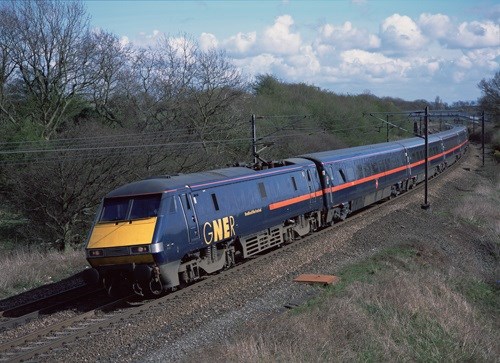

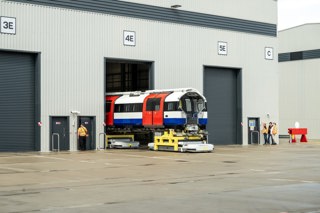
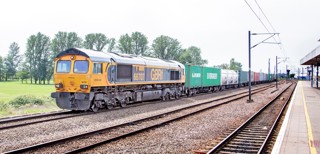
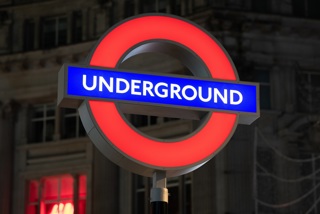



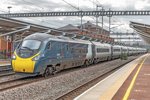








Login to comment
Comments
No comments have been made yet.